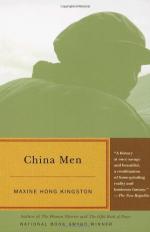
|
| Name: _________________________ | Period: ___________________ |
This test consists of 5 multiple choice questions, 5 short answer questions, and 10 short essay questions.
Multiple Choice Questions
1. What drives the Wild Man to hysterics while he is in the jail?
(a) not being able to speak with the authorities
(b) being locked up for three days straight
(c) The Border Patrol is sending him back.
(d) severe homesickness
2. What does the Hundred-Year-Old man do to rest during his trips to town early in his time in Hawaii?
(a) spends money on women
(b) gambles
(c) smokes opium
(d) smokes cigars
3. What do Kingston's parents call the Chinese American traditionalists in California?
(a) demon workers
(b) sky chickens
(c) superstitious, backward peasants
(d) wheat germ
4. How were the Indians in Alaska treated by the "gold seeking" miners?
(a) They are welcomed as extra labor.
(b) Some are tortured and murdered in public.
(c) They are driven out at gunpoint.
(d) They are kept as slaves by white demons.
5. Who travels to Alaska during the Driving Out to help end the violence?
(a) Alaska's governor
(b) President of the United States
(c) The Calvary
(d) Other company strikers from around the state
Short Answer Questions
1. From whom do MaMa and Father have to keep their savings a secret?
2. Where do the mandarins seeking gold land their ship?
3. What kind of poem does Ch'u Yuan write before he drowns?
4. To what does Kingston refer with the metaphor "the living night"?
5. What does Uncle Bun accuse Father of doing?
Short Essay Questions
1. What does Lo Bun Sun's constant work and preparation suggest about his character?
2. Describe the experience of the AJA's (Americans of Japanese Ancestry) during World War II, using only details from Kingston's retelling of her memories and the stories she heard as a child.
3. What evidence in "The Wild Man of the Green Swamp" is there that shows the Wild Man's ingenuity?
4. Compare and contrast Uncle Bun's beliefs about the benefits of communism and his dreams of a Communist World and Father's political beliefs.
5. What happens to Father after the Gambling House is closed permanently? How does Father recover?
6. Explain why members of the freighter's crew try to send their shipmate to China and describe the Wild Man's response at the airport.
7. What is the significance of the last line in "The Hundred-Year-Old Man"?
8. Explain why the Hundred-Year-Old Man's answer about how to stop the war in Vietnam is so simple.
9. How does Kingston give the reader information about the Communist Revolution and the later wars? Include details about her brother's experience in the Navy as a pacifist.
10. Why does the author suggest that instead of the Driving Out in Alaska taking place twice that it could be the same story but with the dates mixed up?
|
This section contains 1,774 words (approx. 6 pages at 300 words per page) |

|




